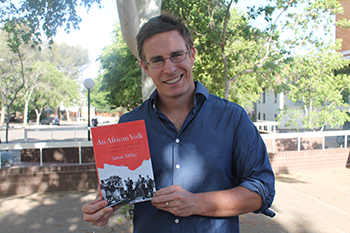Latest News Archive
Please select Category, Year, and then Month to display items
31 July 2020
|
Story Lacea Loader

As a public higher-education institution in South Africa with a responsibility to contribute to public discourse, the University of the Free State (UFS) will be presenting the 3rd UFS Thought-Leader Series in collaboration with Vrye Weekblad as part of the Vrystaat Literature Festival’s online initiative, VrySpraak-digitaal.
This year, higher-education institutions
globally are placed in the challenging context of COVID-19. Aware and grounded in the reality that the world will not return to the normality of pre-COVID-19, our responsibility as scholars still remains to contribute to public discourse and to offer
innovative solutions that will impact the lives of people nationally and globally in order to help them understand and adapt to a new world order.
Against this background and context, this year’s debates focus on ‘Post-COVID-19, Post-Crisis’,
with Health and Modelling, Politics, Economy, and Predictions for 2021 as the sub-themes. Placed in a COVID-19 context, and in lieu of the Vrystaat Arts Festival,
the series will be presented virtually in the form of one webinar per month during the period August 2020 to November 2020.
Date: 13 August 2020
Topic: Health
and Modelling
Time: 11:30-13:00
RSVP: Alicia Pienaar, pienaaran1@ufs.ac.za
Facilitator:
Max du Preez
Editor: Vrye Weekblad
Biography
Introduction and welcome:
Prof Francis Petersen
Rector and Vice-Chancellor, UFS
Panellists:
Prof Salim Abdool Karim
Director: Centre for the AIDS Programme of Research in South Africa (CAPRISA)
Chair: South African Ministerial Advisory Committee on COVID-19
Biography
Prof Glenda Gray
President and CEO: South African Medical Research Council (SAMRC)
Biography
Prof Felicity Burt
NRF-DST South African Research Chair in vector-borne and zoonotic pathogens research
Biography
US author launches book at UFS on African volk
2016-10-17

Dr Jamie Miller, Postdoctoral Fellow at the
University of Pittsburgh and author of
An African Volk: The Apartheid Regime
and Its Search for Survival.
Photo: Rulanzen Martin
“I realised the importance of not just accessing the policies and political approaches of the leaders of the apartheid regime, but understanding the ideas and world views that informed them. Part of the solution to this was to learn Afrikaans.”
This is according to Dr Jamie Miller, a Postdoctoral Fellow at the University of Pittsburgh, on how he went about getting inside the mind of South Africa’s apartheid regime in order to complete his book, An African Volk: The Apartheid Regime and Its Search for Survival.
The book was launched on 11 October 2016 by the Archive for Contemporary Affairs at the University of the Free State on the Bloemfontein Campus.
Volk refers to the Afrikaner nationalist movement
The book is an ambitious new international history of 1970s apartheid South Africa. It is based on newly declassified documents and oral histories, the majority in Afrikaans, which focus on the regime’s attempts to turn the new political climate to its advantage.
The term volk refers to the Afrikaner nationalist movement, also known as Afrikanerdom. The story of Afrikaner nationalism was the medium through which the regime gained power.
Four main messages from the book
Dr Miller says there are four main messages for his readers. Firstly, the apartheid regime looked to contest and hijack new ideas and norms that formed the postcolonial world, and secondly, that we need to start thinking more seriously about the Cold War in terms of domestic politics, not just geopolitics.
Thirdly, South Africa should be integrated into histories of the global South, and lastly, we should conceptualise the apartheid regime by looking at it not just as an imperial holdover, but also by looking at what was happening in the world in the time period in question.